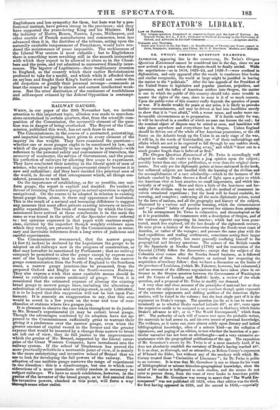RAILWAY GAUGES.
"Washy, in our paper of the 29th November last, we invited attention to this important topic, allusion was made to apprehen- sions entertained in certain quarters, that, from the scienqfic com- position of the Coramission, the mercantile element of the ques- tion was in danger of being overlooked. The Report of the Com- mission, published this week, has set such fears to rest.
' The Commissioners, in the course of a protracted, painstaking, and impartial investigation, have given to every element of the inquiry its due weight. They have examined the questions— whether one or more gauges ought to be sanctioned by law, and which of the gauges actually in use ought to be preferred—with reference to the personal safety and convenience of travellers, the economy of commerce, the service of Government, and the possi- ble perfection of railways by allowing free scope to experiment. They have conducted their scrutiny in the liberal spirit of men of science, who reject no proposed improvement simply because it is new and unfamiliar ; and they have decided like practical men of the world, in favour of that arrangement which, all things con- sidered, promises to work hest.
On the importance of establishing, as far as possible, one uni- form gauge, the report is explicit and decided. Its verdict in favour of retaining the narrow gauge in actual operation is equally 'unequivocal. Oh the course'to be adopted in relation to existing• broad gauge lines, alone, is there any appearance of hesitation. This is the result of a natural and becoming diffidence to suggest any measure that must affect private existing interests or involve public expenditure. The train of reasoning by which the Com- missioners have arrived at these conclusions is in the main the same as was traced in the article of the Spectator above referred to : but opinions expressed in that paper with cautious scepti- cism, dictated by the imperfect though weighty evidence upon which they rested, are presented by the Commissioners as neces- sary and inevitable inferences from a long series of judicious and careful experiments.
The Commissioners recommend, that the narrow gauge (4 feet 81 inches) be declared by the Legislature the gauge to be adopted on all railways now in the progress of construction, or that may hereafter be sanctioned by Parliament ; that no railway company be permitted to alter the gauge except by express con- sent of the Legislature ; that in order to complete the narrow gauge communication from the North of England to the Southern coast, a narrow gauge junction-line be promoted, from the proposed Oxford and Rugby to the South-western Railway. They also express a wish that some equitable means should be found to establish an entire uniformity of gauge. When it is considered that the estimated expense of altering the existing broad gauge to narrow gauge lines, including the alteration or substitution of locomotives and carrying-stock, is only 1,080,0001., it is to be hoped that this suggestion will not be lost upon Par- hament It is scarcely an exaggeration to say, that this sum would be saved in a few years on the wear and tear of mer- chandise at stations where two gauges join.
It is pleasant to observe the care taken throughout to do justice to Mr. Brunel's experimental (it may be called) broad gauge. Though the advantages conferred by its adoption have not ap- peared to the Commissioners sufficiently great to warrant their giving it a preference over the narrow gauge, even when the greater amount of capital vested in the former and the greater expense that would be incurred by a change from narrow to broad are left out of view, they do full justice to the improvements which the genius of Mr. Brunel, supported by the liberal enter- prise of the Great Western Company, have introduced into the anilway system. If the school of Stephenson has proved the more practicallneliablein a mercantile point of view, it is mainly in the more enterprising and inventive school of Brunel that we are to look for developing the full powers of the railway. The adoption of one uniform gauge narrows the range of experiment In one direction : this is a disadvantage, but one to which con- siderations of a more immediate utility renders it necessary to subject railways. We have so much confidence, however, in the genius of the inventor of the broad gauge, as to feel assured that his inventive powers, checked at this point, will force a way through some other outlet.


























 Previous page
Previous page